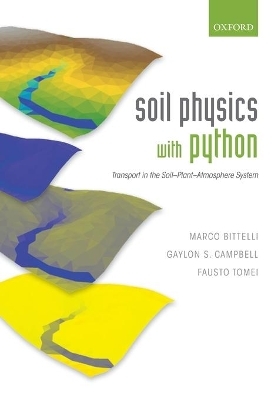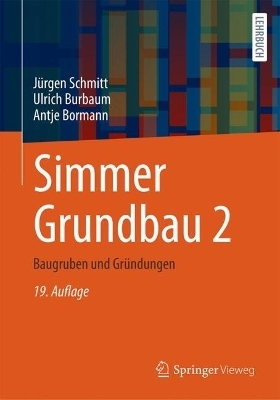
Soil Physics with Python
Oxford University Press (Verlag)
978-0-19-885479-1 (ISBN)
This innovative study presents concepts and problems in soil physics, and provides solutions using original computer programs. It provides a close examination of physical environments of soil, including an analysis of the movement of heat, water and gases. The authors employ the programming language Python, which is now widely used for numerical problem solving in the sciences. In contrast to the majority of the literature on soil physics, this text focuses on solving, not deriving, differential equations for transport. Using numerical procedures to solve differential equations allows the solution of quite difficult problems with fairly simple mathematical tools. Numerical methods convert differential into algebraic equations, which can be solved using conventional methods of linear algebra. Each chapter introduces a soil physics concept, and proceeds to develop computer programs to solve the equations and illustrate the points made in the discussion.
Problems at the end of each chapter help the reader practise using the concepts introduced. The text is suitable for advanced undergraduates, graduates and researchers of soil physics. It employs an open source philosophy where computer code is presented, explained and discussed, and provides the reader with a full understanding of the solutions. Once mastered, the code can be adapted and expanded for the user's own models, fostering further developments. The Python tools provide a simple syntax, Object Oriented Programming techniques, powerful mathematical and numerical tools, and a user friendly environment.
Marco Bittelli received his degree in Agricultural Science from the University of Bologna, Italy, as well as a M.S. and Ph.D. degrees in Soil Physics from Washington State University, USA. He spent a year as a postdoctoral scientist in the Physics Department at the University of Heidelberg, Germany. He now teaches courses in soil physics, hydrological modelling, and scientific methods at the undergraduate and graduate level, at the University of Bologna, Italy. He is a referee for the National Science Foundation, USA, and he also serves as a reviewer for international journals. He is the author and the coauthor of 40 journal papers, 3 book chapters, and over 50 papers in conference proceedings. Gaylon S. Campbell received a B.S. in Physics and M.S. in Soil Physics from Utah State University, USA; and a Ph.D. in Soil Physics from Washington State University, USA. He served as Captain, U.S. Army, doing meteorological research at White Sands Missile Range, New Mexico. He was Professor of Soils and Biophysics at Washington State University, USA, from 1971 to 1998. He has been Vice President, Engineer, and Senior Scientist at Decagon Devices, Inc., from 1998 to the present. He has written 3 books, over 100 journal articles and book chapters, and has several patents. Fausto Tomei received a degree in Mathematics and Computer Science from the University of Bologna, Italy. He is a researcher at the Regional Agency for Environmental Protection, Emilia-Romagna Region, Italy. His research focuses on numerical analysis of hydrological processes and software development. He is the author and the coauthor of 10 journal papers, 1 book, 2 book chapters, and over 30 papers in conference proceedings. He has worked on several Italian and European projects, on climate change, soil hydrology and agriculture.
1: Introduction
2: Basic physical properties of soil
3: Soil gas phase and gas diffusion
4: Soil temperature and heat flow
5: Soil liquid phase and soil-water interactions
6: Steady state water flow and hydraulic conductivity
7: Variation in soil properties
8: Transient water flow
9: Triangulated irregular network
10: Water flow in three dimensions
11: Evaporation
12: Modeling coupled transport
13: Solute transport in soils
14: Transpiration and plant-water relations
15: Atmospheric boundary conditions
1: Introduction
2: Basic physical properties of soil
3: Soil gas phase and gas diffusion
4: Soil temperature and heat flow
5: Soil liquid phase and soil-water interactions
6: Steady state water flow and hydraulic conductivity
7: Variation in soil properties
8: Transient water flow
9: Triangulated irregular network
10: Water flow in three dimensions
11: Evaporation
12: Modeling coupled transport
13: Solute transport in soils
14: Transpiration and plant-water relations
15: Atmospheric boundary conditions
| Erscheinungsdatum | 08.04.2020 |
|---|---|
| Zusatzinfo | 57 figures and/or tables |
| Verlagsort | Oxford |
| Sprache | englisch |
| Maße | 169 x 241 mm |
| Gewicht | 848 g |
| Themenwelt | Naturwissenschaften ► Geowissenschaften ► Geologie |
| Naturwissenschaften ► Physik / Astronomie ► Thermodynamik | |
| ISBN-10 | 0-19-885479-X / 019885479X |
| ISBN-13 | 978-0-19-885479-1 / 9780198854791 |
| Zustand | Neuware |
| Informationen gemäß Produktsicherheitsverordnung (GPSR) | |
| Haben Sie eine Frage zum Produkt? |
aus dem Bereich


